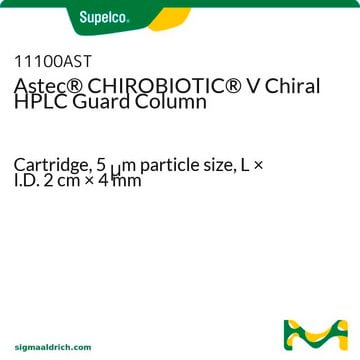12024AST
Astec® CHIROBIOTIC® T Chiral (5 μm) HPLC Columns
L × I.D. 25 cm × 4.6 mm, HPLC Column
Synonym(s):
CHIROBIOTIC T Column
About This Item
Recommended Products
product name
Astec® CHIROBIOTIC® T Chiral HPLC Column, 5 μm particle size, L × I.D. 25 cm × 4.6 mm
material
stainless steel column
Quality Level
Agency
suitable for USP L63
description
HPLC column
product line
Astec®
packaging
pkg of 1 ea
manufacturer/tradename
Astec®
parameter
0-45 °C temperature
241 bar pressure (3500 psi)
technique(s)
HPLC: suitable
LC/MS: suitable
L × I.D.
25 cm × 4.6 mm
matrix
High-purity silica gel particle platform
fully porous particle
matrix active group
teicoplanin glycopeptide phase
particle size
5 μm
pore size
100 Å
operating pH range
3.8-6.8
separation technique
chiral
Looking for similar products? Visit Product Comparison Guide
Related Categories
General description
- Bonded phase: Teicoplanin
- Operating pH range: 3.8 - 6.8
- Particle diameter: 5, 10 or 16 μm
- Pore size: 100 Å (CHIROBIOTIC® T) or 200 Å (CHIROBIOTIC® T2)
CHIROBIOTIC FAQs
CHIROBIOTIC Reference Bibliography
Chiral Product Literature
Application
- Chiral liquid chromatography-mass spectrometry (LC-MS/MS) method development for the detection of salbutamol in urine samples.: This study utilizes the Astec CHIROBIOTIC T Chiral HPLC Column to develop an LC-MS/MS method for detecting and quantifying salbutamol enantiomers in urine samples. This application demonstrates the column′s utility in biomedical and clinical research, particularly in the analysis of chiral drugs in biological matrices (Chan et al., 2016).
- High-performance liquid chromatographic enantioseparation of 2-aminomono- and dihydroxycyclopentanecarboxylic and 2-aminodihydroxycyclohexanecarboxylic acids on macrocyclic glycopeptide-based phases.: This research focuses on the enantioseparation of various amino acids using the Astec CHIROBIOTIC T Chiral HPLC Column, highlighting its effectiveness in separating complex chiral molecules. The study underscores the column′s application in the enantioselective analysis of amino acids and related compounds in chemical and pharmaceutical research (Berkecz et al., 2009).
Legal Information
Application
Storage Class Code
13 - Non Combustible Solids
WGK
WGK 3
Flash Point(F)
Not applicable
Flash Point(C)
Not applicable
Choose from one of the most recent versions:
Already Own This Product?
Find documentation for the products that you have recently purchased in the Document Library.
Customers Also Viewed
Related Content
Astec CHIROBIOTIC™ T Chiral HPLC Columns - CHIROBIOTIC phases are based on covalently bonding macrocyclic glycoproteins to a high purity, spherical silica gel in such a way as to establish its stability while retaining essential components for chiral recognition.
Chromatograms
application for HPLCapplication for HPLCapplication for HPLCapplication for HPLCShow MoreOur team of scientists has experience in all areas of research including Life Science, Material Science, Chemical Synthesis, Chromatography, Analytical and many others.
Contact Technical Service








